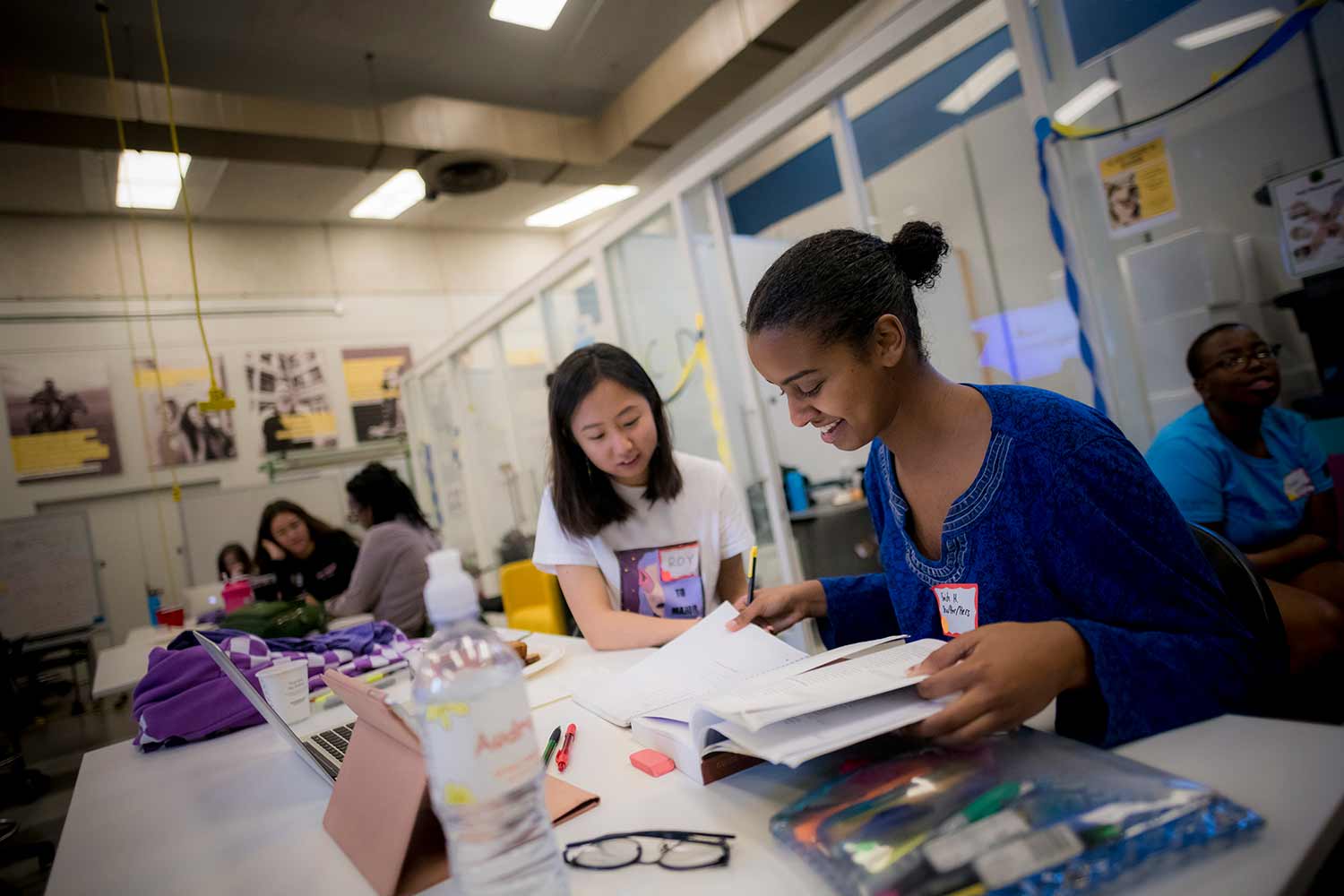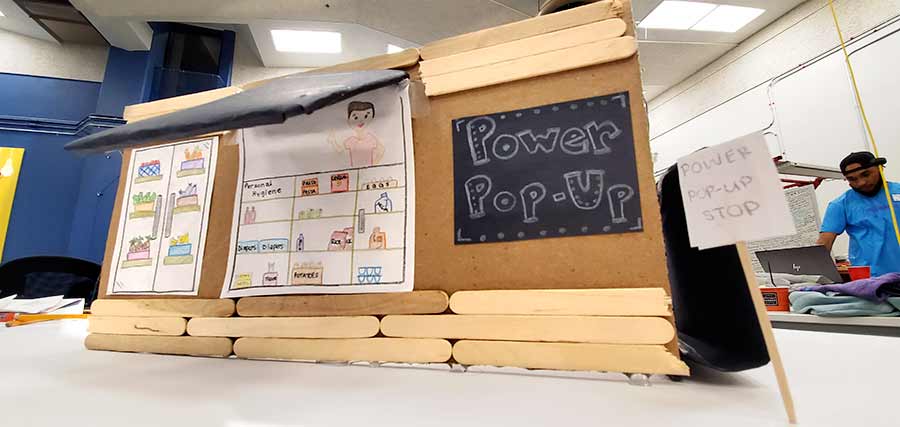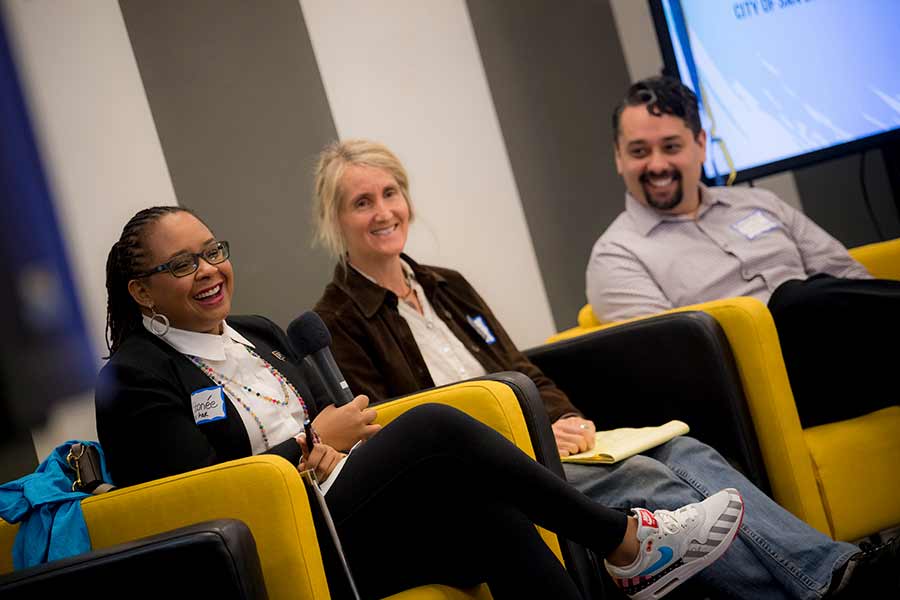
By:
- Erika Johnson
Published Date
By:
- Erika Johnson
Share This:

Students joined in a unique hackathon-style event to brainstorm ideas on how to design smart cities that serve diverse communities. Photo by Erik Jepsen/UC San Diego Publications
Twelve-Hour Race to Design a Diverse Smart City
Inaugural ‘Change-A-Thon’ challenges students to address obstacles impacting black communities
How can cities be both smart and inclusive? And what would it look like if neighborhoods and systems were developed through the lens of an underserved community? Undergraduates at UC San Diego were challenged to think through solutions to issues and obstacles impacting black communities during a 12-hour ‘Change-a-Thon’ event held on campus Saturday.
For Kaelyn Ford and Maliq de Piña, it would mean making key changes in the health care system to prevent pregnancy-related death among black women. And Jaida Day and Senuri Boralessa envision a mobile food truck that could improve access to nutritious food among communities that reside in food deserts.
The inaugural Change-a-Thon event was led by the UC San Diego Black Resource Center in partnership with The Basement, the campus’s entrepreneurship hub, and focused on the theme “Envisioning Smart Cities through the Lens of Blackness.” It was hosted in the style of a hackathon; instead of spending the day programming computer software, however, students were given flexibility to build a model, write a new policy and design other types of change plans.
Students had the opportunity to explore issues within three areas of focus, including health and wellness; law and community enforcement; and access. Under these categories, a range of subtopics were suggested—from algorithms used to guide law enforcement practice to lack of access to contracts for black-owned companies and facial recognition technology.
Ford and de Piña had not met before the event, but their interests aligned well. Together, they filled up a dry erase board with their ideas, centered on addressing racial stigmas in health care. Their concept paired artificial intelligence software to track interactions between doctors and patients as well as communication liaisons that could minimize implicit bias during examinations. “My teammate is a bioengineering major and I am studying human biology, so it ended up working out,” explained Ford. “We bring two different perspectives but still feel the same way about issues like health and wellness.”
For teams that wanted to bring their sketch into three dimension, there was poster board, glue guns, popsicle sticks, colored pencils, construction paper and other tools available. Day and Boralessa constructed a model of a school bus transformed into a mobile food truck, complete with drawings of nutritious food and personal hygiene products to demonstrate their idea for a “Power Pop-Up.” Their project aims to improve access to nutritious resources for communities that reside in food deserts where there are no healthy options available, as well as provide education about CalFresh to reduce the stigma about reaching out for assistance.

Creativity was encouraged among teams, several of which built miniature models of their ideas, like this mobile food truck stocked with nutritious fare. Photo by Erika Johnson/UC San Diego Communications
“The possibility for anybody's ideas in here to become a reality is really cool; it makes me feel like the things that we do can become possible,” said Day, a math and computer science major who also serves as a Student Success Leader at the Black Resource Center. The project was meaningful for Boralessa as well, a pre-med student studying human biology and global health and student lead for The Hub Basic Needs Center.
“We created the Change-a-Thon to be a catalyst for students to think outside of their everyday experiences and recognize the power they have to enact change,” said Porsia Curry, director of the Black Resource Center. “Our students are brilliant; I believe they have the knowledge and persistence to end all of our world's problems. We are here to provide them with the tools to execute their bright ideas.”
In the morning, a panel of campus and community experts motivated the students during a deep discussion about the importance of integrating the needs and perspectives of marginalized communities when conceiving future technology and city blueprints. Speakers included Interim Assistant Vice Chancellor for Student Retention and Success and engineer Ebonée Williams; Leslie R. Lewis, a lecturer in the Department of Urban Studies and Planning; and Roberto Torres, a climate equity manager for the City of San Diego.

To help students get into the right mind frame, a panel of campus and community leaders shared examples of real-life impacts that technology and access can have. Photo by Erik Jepsen/UC San Diego Publications
Their main message: be intentional in your problem solving. “If you're not paying attention to the already intersecting systems of inequity and oppression that are operating, and you just throw new technology at something and think it's going to help, you're going to reproduce those systems,” explained Lewis.
At the end of the night, each team pitched their idea to a panel of judges. They were scored on innovation, idea articulation, theme relevance, impact on the black community, and capability. One team from each focus area was then chosen to receive full access to The Basement’s Incubator Program to bring their idea to fruition. Over the next year, they will gain tools to prototype, receive advice from mentors and technologists, participate in workshops to learn skills such as creating a pitch, receive a $500 award towards their project and more.
Share This:
You May Also Like
Stay in the Know
Keep up with all the latest from UC San Diego. Subscribe to the newsletter today.


